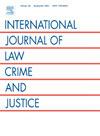揭露法官在巴西量刑中的性别效应:女性在刑事司法系统中的反霸权角色?
IF 1.4
4区 社会学
Q3 CRIMINOLOGY & PENOLOGY
International Journal of Law Crime and Justice
Pub Date : 2025-09-24
DOI:10.1016/j.ijlcj.2025.100789
引用次数: 0
摘要
本文利用本文章由计算机程序翻译,如有差异,请以英文原文为准。
Uncovering judges’ gender effects in Brazilian sentencing: A counter-hegemonic role of women in the criminal justice system?
This article examines whether judge and defendant gender influence custodial sentencing in Brazil, drawing on a dataset of 1261 convictions issued by the São Paulo State Court of Justice in 2022. Focusing on four high-incidence offenses—simple theft, aggravated theft, robbery, and drug trafficking—the study employs nonparametric statistical tests and multiple linear regression modeling to assess the impact of extralegal factors on sentencing outcomes. Findings reveal that male judges impose significantly longer sentences than female judges in drug trafficking cases, with an average difference of 133 days, even after controlling for legally relevant variables. No systematic effects were observed regarding defendant gender or judge-defendant gender interactions. We interpret these results through a feminist criminological lens, proposing that female judges may perform a counter-hegemonic role in discretionary sentencing practices characterized by punitiveness and inequality. By situating its findings within feminist legal theory and Global South criminologies, the study contributes to critical debates on gender, punishment, and the political dimensions of judicial discretion.
求助全文
通过发布文献求助,成功后即可免费获取论文全文。
去求助
来源期刊
CiteScore
2.70
自引率
0.00%
发文量
25
审稿时长
47 days
期刊介绍:
The International Journal of Law, Crime and Justice is an international and fully peer reviewed journal which welcomes high quality, theoretically informed papers on a wide range of fields linked to criminological research and analysis. It invites submissions relating to: Studies of crime and interpretations of forms and dimensions of criminality; Analyses of criminological debates and contested theoretical frameworks of criminological analysis; Research and analysis of criminal justice and penal policy and practices; Research and analysis of policing policies and policing forms and practices. We particularly welcome submissions relating to more recent and emerging areas of criminological enquiry including cyber-enabled crime, fraud-related crime, terrorism and hate crime.

 求助内容:
求助内容: 应助结果提醒方式:
应助结果提醒方式:


